Don’t worry, we’re getting to the end of our Dollhouse series. Or maybe you should worry, if you’ve been enjoying this as much as I have.
And I really have been enjoying talking about Dollhouse this much. It’s reminding me that this show alone contains enough philosophical depth and really great character work to fill a reasonably sized book. Maybe I’ll do that someday too. But for now, let’s get on with some final points.
Well, really one final point. Chiefly, Echo’s story in Dollhouse is a resolution of Faith’s story in Buffy the Vampire Slayer. And not just because Eliza Dushku plays both of them.
If you just let out a massive “Huh?” at your computer, then don’t worry, I’ll explain it all. I don’t really blame you for it either. On the surface, the two shows don’t have a whole lot in common. For starters, Dollhouse is science-fiction while Buffy is urban fantasy. Dollhouse is about high-tech prostitutes, and Buffy is about vampire slayers and the evils of high school. Dollhouse’s youngest character is like 25; Buffy is about teenagers.
The list keeps going. While there are some superficial similarities between the shows (both created by Joss Whedon, both include a mid-40s British person, both have tiny female heroines with ninja powers), there’s not a whole lot of cohesion between the two.
Except for the part where there really really is.
So Dollhouse is about consent and personhood, right? And Buffy is about being a teenager and growing up. Well, those are just different parts of the same story.
Faith Lehane is the Vampire Slayer. She was Called when she was about fifteen, we think, comes from a lower-class Boston background, and has clearly led a rough and tumble life. When she comes to Sunnydale she isn’t really accepted, and has to fight for her place in the group. They see her as defective, other, and a little scary.
As a result of her social status, Faith is persuaded to join the dark side, in this case the forces of the Mayor, a sinister dark wizard who happens to be an incredibly polite small town mayor with a lust for human sacrifice and good civic values. He takes Faith in, and basically adopts her as his daughter. He gets her a place to live. He lavishes attention and love on her. And when he thinks she’s dead, he freaks the crap out.
Later, Faith (who was in a coma) wakes up and tries to take vengeance for her dead father-figure, only to slowly realize that the dude was pretty aggressively evil, and she might want to consider therapy. She goes on a long journey of personal growth, eventually ending up in prison, and then out of prison as the gang gears up to fight one last big bad.
When the fight is over, and Faith realizes they’ve won, she’s shocked and relieved. And also has a new romantic prospect, one who just might be more emotionally healthy for her than all the other guys she’s dated in the past.
Echo’s story is the same, but in a different key. Here, we know almost nothing of Caroline’s actual background, only what we gather from about her mid-20s and onward. It’s not very important for the show, ultimately.
What matters is who Echo is. On the course of her arc on the show, we see Echo start to gain awareness of herself and her situation, be targeted by a malevolent male character who effectively “rapes” her (Alpha and the whole mind rape thing). We see her put her trust in a male father figure who ultimately betrays her, and we see her learn to heal and let people in.
Both shows are about identity, and not just identity in general, but specifically female identity. Faith and Echo grapple with questions of romance, sex, discrimination, motherhood, and where they fit in the world. But being super general isn’t going to get my point across. Because it’s not just that the two shows are similar. My point is that Dollhouse is a resolution of the issues from Buffy.
Faith’s main issues had to do with being uncomfortable with herself as a person, feeling like sex was the only thing she had to offer, being desperate for someone to love her but being incapable of accepting that love, and feeling completely, disconsolately alone.
Echo has those exact same problems, even though she’s not always aware of them.
In Dollhouse, it’s not so much that Echo expresses a belief that she’s only good for sex, but it’s something that seems to be shown in the storytelling. After all, that’s what a majority of the engagements are about. Echo is hired for sex, and asked to leave when it’s over. Even her romantic engagements are never about her, they’re about the romantic needs of her partner. She’s just a warm body. Literally.
As for being uncomfortable with herself as a person, it’s not really that Echo is aware of this, because Echo isn’t really aware of anything much at the start of the show, but that it develops as the show continues. When we first meet Echo, she’s totally comfortable in her identity, but then when Alpha causes her composite event, and suddenly there is a mass of voices in her head, Echo becomes unsure. She gains surety again when she takes control of the voices and makes them her own.
By the end of the second season, Echo knows who she is. Not as Caroline or as a shell waiting for Caroline to come home, or even as a collection of voices all screaming together. No, Echo is Echo. She’s all of these things and more. She is completely comfortable in her skin. But she’s still lonely.
Which brings us to her need for love. Echo’s great love in the series isn’t really Paul Ballard, as much as we would like to think it is. I mean, he’s great and all, but it’s so up and down with those two, and mostly I like them as friends.
No, Echo’s true love story is a platonic one, with Boyd, her handler at the start of the show, and father figure throughout. SPOILERS, but you probably know where I’m going with this.
Boyd isn’t just Echo’s father figure, he’s her mentor, her protector, and her guide into what it means to be human. He cares for her in every sense of the world. So obviously he’s totally evil, right?
Because this is a show full of character reveals and plot twists, it turns out that Boyd isn’t just Echo’s handler and later the Dollhouse’s head of security. He’s actually the founder of the Rossum Corporation, which owns the Dollhouse. Boyd is the man in charge, and Echo’s met him before, back when she was Caroline.
We find out that not only is Boyd secretly the big bad, he’s also been manipulating things behind the scenes for ages. He’s the reason Caroline became a Doll, became Echo. He put himself in place to help her develop. They wanted her to become self-aware, because they know she’s special. Boyd knows she’s special. And they want to use her.
It’s a darker, even more twisted version of Faith’s relationship with the Mayor. Because Boyd really does love Echo. She’s his daughter, effectively. He’s just the creepiest most manipulative and borderline abusive dad pretty much ever.
The way it progresses, though, is that Echo actually gets closure. Where Faith is taken out of commission before the Mayor goes down, Echo watches it in real time. She sees the slow revelation that Boyd is kind of evil. She figures out what his nefarious plan is, and she is instrumental in bringing him down. In the end, she’s the one who helps him self-destruct.
The third example is kind of more nebulous, but it’s cool. At the end of Buffy, Faith and Buffy have a conversation that pretty much sums up the whole show. “But you're right. I mean, like... I guess everyone's alone, but... being a Slayer? There's a burden we can't share.”
To which Faith replies with the ever quotable, “Thank God we’re hot chicks with superpowers,” but the point stands.
Faith feels alone because of her position in the world. True, Buffy is also a Slayer, but there was only ever meant to be one Slayer at a time. They have trouble getting along, and they still feel fundamentally alone all the time. Faith has trouble letting people in. A lot of trouble. At the end of the show, she sort of gets a sweet little romance going with Robin, the son of another Slayer, but we don’t actually know if that will work out. All we know is that Faith is now ready to try.
So fast forward to the end of Dollhouse. Here, again, Echo is special, different, completely unique in the world and utterly alone. She talks about it with Paul, who’s kept her company for the last ten years, but still feels like an outsider to her. As he says, “You’ve got how many people in there [her head]. But you’re still the loneliest person I know.” Or something like that. I couldn’t find an exact transcript.
And Echo is flattered, until Paul dies moments later and she realizes that she absolutely never let him in, even when he begged. She held herself so lofty that she let herself be alone. And she realizes it.
The difference is agency. In all of these situations, Faith and Echo experience roughly the same events, but the difference is that in all of them, Echo is master of her own actions. She is never not the acting agent in her own life, even when she’s a helpless Doll. She’s still in control.
How cool is that? When you look at the two shows, it’s almost like you’re watching the actress and the writers growing up. Same song, different key. And it turns out it’s a hell of a lot more interesting this way. Because this way we know that Echo is the one responsible for herself. She isn’t relying on anyone else to be her moral compass, emotional support, or even to tell her what did or did not happen. Even when she’s unsure, she’s her own woman.
But more than that, the storytelling itself changes. No longer is the character out of it or invisible during moments that would change her life, she’s a participant. Making choices, making mistakes, freaking out.
It matters. Faith was a cool character, but Echo is a good one. Echo is who Faith should have been. And we’re pretty lucky to get to see it.
 |
| Awwww. The memories. The terrifying, traumatizing memories. |

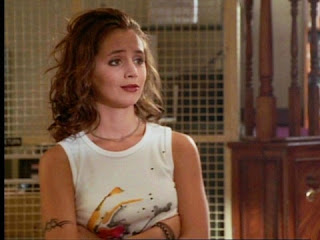
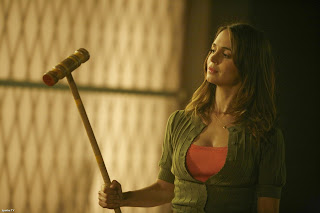
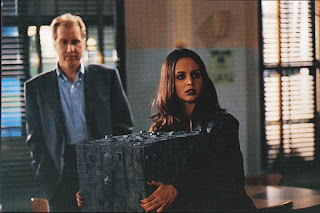


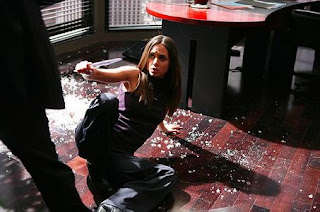
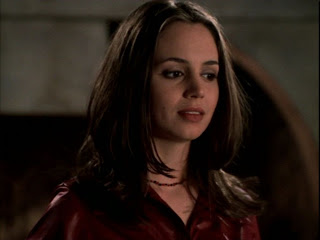
Faith was 1 month older than Buffy so that would make Faith 17 when she became the Slayer. Buffy was 15 when she became the Slayer. I felt like the Scooby Gang immediately accepted Faith, especially since the previous episode they were on the outs with Buffy (blamed her for leaving in Becoming #2 despite the fact that she got kicked out of school and her home and was wanted for a murder she didn't commit and realized Xander lied about the restoration spell and her second Watcher nearly died in the hands of vampires like her first Watcher and was grieving/guilting over having to send Angel to Hell). Faith couldn't maintain friendships with the group because she didn't grow up in an environment that had the building blocks of a genuine and successful relationship (caring, trust, empathy, etc.) so despite wanting that from others she couldn't provide it (she was about take instead of give, feeling she was owed) or recognize them (she saw concern as pity, being vulnerable as weakness). She wanted the love/trust/idolization people gave Buffy but didn't realize that Buffy worked hard to earn that trust, proved her own love, and that idolization came with being put on an unfair pedestal.
ReplyDeleteI never really thought her revenge at Buffy in S4 was really about the Mayor. I felt it was more about believing that Buffy didn't care about her since Buffy wasn't with Angel anymore. She would've been okay with Buffy stabbing her to save the guy she thought of as the love of her life but if she wasn't even with him 8 months later and had moved on to some new guy it meant Buffy was willing to kill her just over any bloke. "She's too busy climbing onto her new boytoy to give any thought to the people that matter!" She didn't know that Angel was the one that ended the relationship and that even though Buffy was with Riley now she still loved Angel and that actively trying to kill Faith in Graduation Day was a very tough decision for Buffy.
BtVS is great with transitions/segue ways, having the meaning of one scene carry into the next scene even though it's a different storyline. Notice that when Faith is walking alone at night we hear Buffy say "you know I never stopped thinking about you". Even though she was talking to Riley about his week in the military hospital we are supposed to realize it also applied to Buffy/Faith.
I don't think Faith being the Slayer is why Faith felt alone. It's definitely the leading reason Buffy feels alone. In a lot of ways becoming the Slayer helped Faith's plight and gave her something that could improve her life, empower her, give her a cause if she chose to take it up while for Buffy becoming the Slayer was the root of all her troubles. Faith told Buffy in End of Days that she always felt alone but didn't realize until she was the leader for a couple of days how even more alone Buffy felt having been leader all those years. Buffy felt loneliness from the stress and isolation of being The Slayer while Faith felt alone from not being equipped to nurture or put in the effort to form real, meaningful relationships.